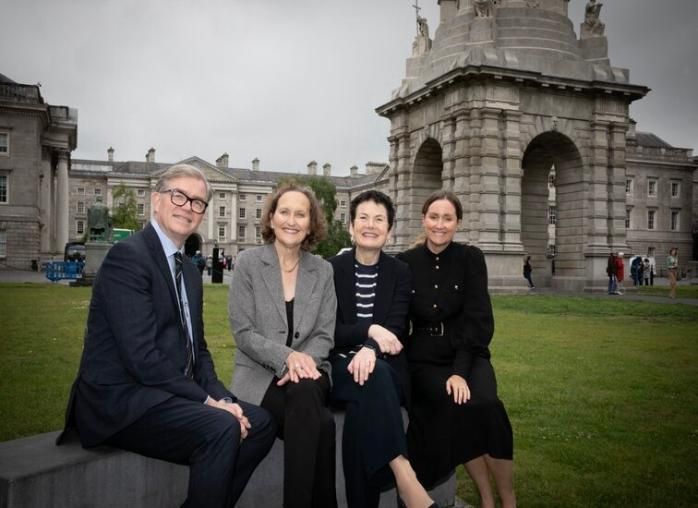Trinity names its first professor specialising in cerebral palsy
Posted on: 28 July 2025
The first Associate Professor of Cerebral Palsy has been appointed at Trinity College, supported by philanthropic funding through the Cerebral Palsy Foundation.
Professor Denise McDonald will head a Cerebral Palsy Research Hub at Trinity focused on musculoskeletal and orthopaedic care for children and adolescents and she will also coordinate the work of eight PhD students in Trinity currently researching different aspects of cerebral palsy care.

Pictured at the announcement were (from left) Colin Doherty, head of the school of medicine in Trinity, newly appointed professor Denise McDonald, Lily Collison, Cerebral Palsy Foundation board member and Rachel Byrne, executive director of the Cerebral Palsy Foundation.
Cerebral palsy (CP) is the most common cause of disability in Irish children. Around 3,000 children and 9,500 adults have the condition which is caused by a brain injury that occurs before, during, or shortly after birth. There is no cure but early intervention and effective management cuts risks and significantly reduces the impact on people with the condition.
Prof Denise McDonald said: “The aim is to drive research that will have real meaning for people living with cerebral palsy. This includes understanding the lives of people with CP to influence change in how society and services meet need and helping deliver the next wave of breakthrough interventions. There is an opportunity to pair lived experience and clinical insights with Trinity's unparalleled breadth - spanning medicine, engineering, neuroscience, immunology and data science.”
Around 150 children are diagnosed in Ireland every year but there is no national clinical programme for cerebral palsy within the health system. Many families experience delayed diagnosis which means delayed interventions, therapy and orthopaedic surgery.
Prof Colin Doherty, head of the school of medicine in Trinity, said: “This generous donation provides a unique opportunity for Ireland to become a world leader in cerebral palsy care and treatment. Trinity is working alongside other partners here and overseas to find new diagnostic techniques, new therapies and new pathways of integrated care between the hospital and the community and between childhood, adolescence and adulthood for people with cerebral palsy.”
The Irish Cerebral Palsy Programme of Excellence was established in 2023 to advance CP care and research across four major pillars: Clinical Implementation, Research, Dissemination and Education, Advocacy and Policy. Led by senior Irish clinicians, researchers and the Cerebral Palsy Foundation, and closely collaborating with families, the Irish Cerebral Palsy Programme of Excellence aims to establish a national standard of care for individuals with CP across the lifespan.
Lily Collison, whose son Tommy has CP, is a Cerebral Palsy Foundation board member and a long-time advocate for CP care in Ireland. She is the author and editor of several books aimed at helping parents of children with cerebral palsy.
Lily Collison said: “I’m confident that by 2028, Ireland will be known, or getting known, as a global leader in CP care. Most importantly, every child born with CP in Ireland will have the opportunity to reach their potential: they will be limited by their brain injury, not by their treatment; limited by medical science, not by their postcode.”
The Irish Cerebral Palsy Programme of Excellence aims to embed a national standard of care across the country within five years, with major clinical and research hubs at three universities: detection and intervention for babies led by University College Cork; musculoskeletal and orthopaedic care for children and adolescents led by Trinity; and adult services and supports, led by the Royal College of Surgeons in Ireland.
The Trinity-based hub deploys a multidisciplinary approach because treatment for cerebral palsy involves numerous medical professionals including paediatricians, surgeons, immunologists, physiotherapists, occupational therapists, speech and language therapists, nurses as well as the families.
Rachel Byrne, executive director of the Cerebral Palsy Foundation said: “The aim of the Irish Cerebral Palsy Programme of Excellence is to establish a national standard of care for CP across the lifespan, from birth through to adulthood. We want to ensure that every individual with CP in Ireland receives the right care, in the right place, at the right time.”
Media Contact:
Ciara O’Shea | Media Relations | coshea9@tcd.ie | +353 1 896 4204
